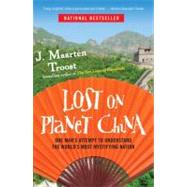
Note: Supplemental materials are not guaranteed with Rental or Used book purchases.
Purchase Benefits
What is included with this book?
J. MAARTEN TROOST is the author of Getting Stoned with Savages and The Sex Lives of Cannibals. His essays have appeared in the Atlantic Monthly, the Washington Post, and the Prague Post. He spent two years in Kiribati in the Equatorial Pacific and upon his return was hired as a consultant by the World Bank. After several years in Fiji and Vanuatu, he recently relocated to the U.S. and now lives with his wife and two sons in California.
The New copy of this book will include any supplemental materials advertised. Please check the title of the book to determine if it should include any access cards, study guides, lab manuals, CDs, etc.
The Used, Rental and eBook copies of this book are not guaranteed to include any supplemental materials. Typically, only the book itself is included. This is true even if the title states it includes any access cards, study guides, lab manuals, CDs, etc.
Excerpted from Lost on Planet China: Or How I Learned to Love Live Squid by J. Maarten Troost
All rights reserved by the original copyright owners. Excerpts are provided for display purposes only and may not be reproduced, reprinted or distributed without the written permission of the publisher.